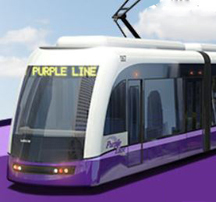Transit First Coalition Sees Progress, Problems in Metro Budget
The Transit First Coalition, composed of Metro riders, environmentalists, labor, and community groups, commented this morning on the new Metro budget proposals submitted yesterday by Interim General Manager Richard Sarles.
Transit First said it was encouraged by the plan to avoid most previously proposed service cuts. It called on Metro to avoid cutting late-night rail service and urged local governments not to substitute cuts bus service for needed financial contributions.
The coalition is deeply concerned, however, by proposed reductions in the transit system's capital budget. The aging Metrorail system requires increasing investments in maintenance and repair to exorcise the specter of a steady decline in service, which would be a disaster for the hundreds of thousands of area residents who depend on Metro every day.
Transit First's comments were in a letter sent to Metro board chairman Peter Benjamin. The full text of the letter is as follows:
April 23, 2010
Dear Mr. Benjamin:
The Transit First Coalition is happy to see the forward movement in developing a Metro operating budget for FY2011. We are especially encouraged by the commitment to largely preserve current levels of service in the Acting General Manager's proposed budget. We are concerned, however, about the planned use of capital funding to balance the operating budget. We urge the Board to find additional mechanisms, beyond the use of revenues from ridership increases, to ensure that this plan does not cause any loss of funding for the system's capital needs.
As for the specifics of the proposed operating budget, Transit First opposes the proposed reduction in late-night rail service. We are also strongly opposed to the use of bus service reductions as part of any jurisdiction's contribution to the additional jurisdictional contributions needed to balance the budget.
While we applaud the progress made on the operating budget, we are deeply disturbed by the proposed capital budget. As David Gunn pointed out to you a few weeks ago, our aging rail system is at severe risk and it is essential to provide the resources required to meet its increasing maintenance needs. Reductions in previous commitments to Metro Matters are unacceptable.
In future years, even the capital funding levels previously recommended by WMATA would leave Metro dangerously short of meeting its identified capital needs. These levels should be treated as an absolute minimum. Elected officials in the District of Columbia and Virginia have expressed a willingness to enter into a new capital funding agreement substantially similar to Metro Matters.
Metro and the funding jurisdictions should renew Metro Matters in substantially the same form and at the levels previously recommended by WMATA. If any jurisdiction feels debt financing is necessary, that jurisdiction should assume responsibility on its own for repaying that debt. Funding difficulties in one jurisdiction should not constrain other jurisdictions that are able to meet capital funding requirements out of current revenues.
We believe that there should be a public hearing process that provides public input into the capital budget as there is for the operating budget. Public hearings on Metro's operating budget in January and March were invaluable in moving the region toward a consensus on the need to preserve service. Hearings on the capital budget could similarly give the public a chance to be heard and move the decision process forward.
We look forward to continuing to work with you and the entire Metro Board of Directors in meeting the challenges of providing transportation services that are so vital to our entire region.
Sincerely, Ben Ross, Chair

